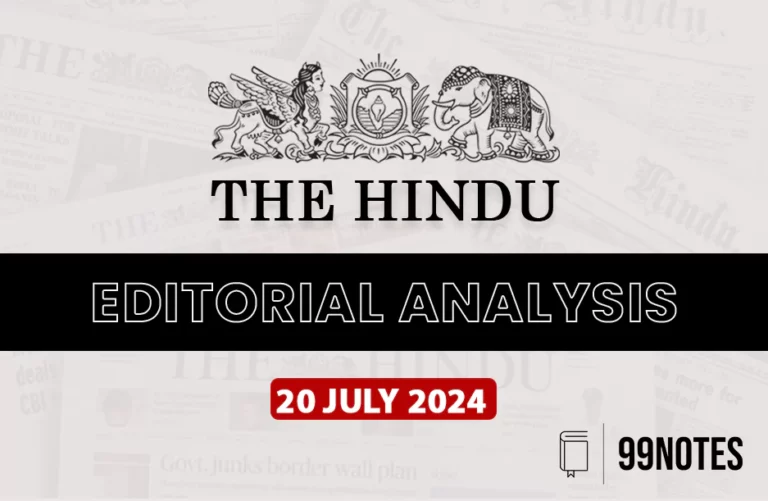4 July 2023 : The Hindu Editorial
The Hindu Editorial
4-July-2023
Daily Current Affairs For UPSC ,The Hindu Editorial Summary
1. India should refuse America’s ‘NATO Plus’ bait
Topic: GS2 – International relations.
Context:
- The United States Permanent Representative to NATO, Julianne Smith, stated that NATO is open to more engagement with India.
- The U.S. House Select Committee recommended including India in the ‘NATO-Plus’ framework.
- India’s External Affairs Minister, S. Jaishankar, rejected the idea, stating that the NATO template does not apply to India.
- Senate India Caucus Co-Chair Mark Warner expressed plans to introduce a bill to bring India into the NATO Plus fold.
What is NATO-Plus:
- NATO-Plus refers to a concept or framework that expands the traditional NATO alliance to include additional countries beyond the original member states.
- It is an unofficial term used in discussions and debates about the potential expansion of the alliance to include other strategic partners.
- The idea behind NATO-Plus is to create a broader security arrangement by incorporating countries that share similar values and security interests with NATO member states.
- These additional countries, often referred to as “Plus” countries, would participate in enhanced defense cooperation and collaborate with NATO on various security issues.
- While there is no official definition or established concept of NATO-Plus within NATO itself, the term is used to describe a potential expansion of the alliance to include countries such as Australia, New Zealand, Japan, Israel, and South Korea.
- These countries are seen as potential partners in countering common security threats and strategic competition, particularly in the context of China’s rise.
- Overall, NATO-Plus is an informal concept that suggests the possibility of expanding the NATO alliance to include additional strategic partners beyond its traditional member states, with the aim of strengthening global defense cooperation and addressing emerging security challenges.
Possible consequences of India joining NATO Plus:
The idea of India joining the NATO Plus framework has generated significant discussions and debates. While there are potential benefits such as access to advanced military technologies and enhanced security cooperation, it is essential to consider the larger context of India’s strategic autonomy. Here are some key points to consider:
- Impact on India-Russia Relations: Joining any NATO framework would likely strain India’s strategic partnership with Russia. Russia has been a valuable partner for India in dealing with regional security challenges and moderating China’s stance. Aligning with NATO could jeopardize this partnership and potentially complicate India’s regional dynamics.
- Limitations on Freedom of Action: Being part of a U.S.-led alliance system may limit India’s freedom of action and independent policy-making, particularly regarding China. It may restrict India’s ability to pursue its own bilateral issues with China and its strategy for the Indo-Pacific. This could result in unintended consequences, such as increased military build-up along the India-China border.
- Potential Impact on Strategic Autonomy: India has long maintained a policy of strategic autonomy, allowing it to engage with various nations and blocs based on its own interests. Joining NATO would require aligning India’s defense and security policies with the objectives and strategies of the alliance, potentially undermining its autonomy. It could strain relationships with other countries and limit flexibility in engaging with regional powers.
- Geopolitical Consequences: Joining NATO Plus would have broader geopolitical consequences. It could impact India’s relationships with neighboring countries and regional organizations that value India’s independent stance. It may also affect India’s flexibility in engaging with other regional powers, potentially altering the dynamics of the region.
Possible advantages of India joining NATO-Plus:
- Enhanced Security Cooperation: Joining NATO-Plus would provide India with an opportunity to strengthen its security cooperation with the United States and other NATO member states. This could lead to increased intelligence sharing, joint military exercises, and enhanced defense capabilities.
- Access to Advanced Military Technologies: NATO countries possess advanced military technologies and equipment. By joining NATO-Plus, India could gain access to these technologies, which would enhance its defense capabilities and modernization efforts.
- Deterrence against Potential Threats: Being a part of NATO-Plus would offer India a security umbrella and deterrence against potential threats from adversaries. It would provide a collective defense mechanism, ensuring that any aggression against India would be met with a strong response from the alliance.
- Increased Regional Influence: Joining NATO-Plus would elevate India’s stature on the global stage and increase its regional influence. It would allow India to actively participate in discussions and decision-making processes regarding security and defense matters in the Indo-Pacific region.
- Counterbalancing China: The focus of NATO-Plus is to counterbalance the influence of China in the Indo-Pacific region. By joining the framework, India could contribute to efforts aimed at maintaining a balance of power and ensuring a free and open Indo-Pacific.
Conclusion:
It is important to note that the advantages of India joining NATO-Plus must be weighed against potential challenges and considerations related to strategic autonomy, regional dynamics, and the impact on existing partnerships. A comprehensive assessment of the costs and benefits is necessary to make an informed decision regarding India’s participation in the framework.
Model question: Discuss the potential implications and challenges for India in joining the NATO-Plus framework. How does it affect India’s strategic autonomy and regional dynamics? (10 Marks).
Source: The Hindu, 4 July 2023, page 4
2. A stocktake before the Global Stocktake
Topic: GS2 – Climate change
Context:
- The Bonn Climate Change Conference held prior to the first Global Stocktake under the Paris Agreement in Dubai focused on several key aspects of climate negotiations.
More information about the Bonn Climate Change Conference, Dubai:
- The conference highlighted the importance of limiting global temperature rise to 1.5°C and the need for adequate finance from developed countries to support developing countries in their emission reduction efforts.
- Additionally, the concept of ‘just transition pathways’ gained traction, emphasizing the need for a fair and inclusive approach to the transformational pathways towards a low-carbon economy.
- The adoption of ‘just transition pathways’ aligns with the Paris Agreement’s self-differentiation principle, allowing developing countries to align their low-carbon development with their specific socio-economic priorities.
Challenges to climate finance highlighted in the conference:
- However, challenges persist in mobilizing climate finance, with the current flows not fully aligned with countries’ identified priorities in their nationally determined contributions.
- The $100 billion annual climate finance commitment by developed countries has not been fully realized, and there is a need for universally agreed-upon metrics for adaptation finance.
- The role of the World Bank in climate change negotiations and its investments in fossil fuels also need to be considered in efforts to align finance with the temperature goals of the Paris Agreement.
Conclusion:
- In summary, the Bonn Climate Change Conference addressed the importance of limiting temperature rise, securing adequate finance, and promoting a just transition.
- It emphasized the need for equity, justice, and fairness in climate negotiations and highlighted the significance of the Global Stocktake in assessing progress and updating climate actions under the Paris Agreement.
Source: The Hindu, 4 July 2023, page 5
Model question: Discuss the key outcomes and challenges discussed at the Bonn Climate Change Conference in the context of global efforts towards addressing climate change. Analyze the challenges related to climate finance and the role of international institutions like the World Bank in aligning financial flows with the goals of the Paris Agreement. (250 words)
3. India must give a bigger push to scheme to deliver potable water
Topic: GS3 – water for all
Context:
- Access to potable tap water is a basic necessity in India, particularly in rural areas.
- In 2019, Central government promised to provide piped, potable water to all rural households by 2024.
- As of now, approximately 64% of rural households have been connected to piped water, a significant increase from the initial 16%.
- However, it is unlikely that the target of connecting all rural households will be achieved by April 2023 due to challenges caused by the COVID-19 pandemic and the Russia-Ukraine war.
Central government’s ‘Har Ghar Jal’ mission:
- The ‘Har Ghar Jal’ mission is an ambitious initiative launched by the Indian government to provide piped, potable water to every rural household in the country.
- The mission aims to ensure that all rural households have access to a minimum of 55 litres of safe drinking water per capita per day.
- The objective of the ‘Har Ghar Jal’ mission is to address the water scarcity and lack of access to clean drinking water faced by many rural communities in India. It is part of the government’s larger vision of achieving universal access to safe drinking water and improving the overall quality of life in rural areas.
- The implementation of the mission involves various key steps. These include identifying water sources, constructing infrastructure for water supply, ensuring water quality testing and monitoring, and building community awareness and participation in water management. The mission also emphasizes the need for sustainability, focusing on long-term operation and maintenance of water supply systems.
- The Ministry of Jal Shakti, responsible for water resources and drinking water supply, plays a crucial role in implementing the ‘Har Ghar Jal’ mission. It collaborates with state governments, local authorities, and other stakeholders to achieve the mission’s objectives.
Source: The Hindu, 4 July 2023, page 5
Model question: Discuss the objectives and implementation of the ‘Har Ghar Jal’ mission in India, highlighting its significance in addressing water scarcity in rural areas. Also, examine the challenges faced in achieving universal access to safe drinking water and suggest measures to overcome them. (250 words)
For Enquiry

4 July 2023 : The Hindu Editorial

4 July 2023 : Daily Quiz

4 July 2023 : Daily Current Affairs

3 July 2023 : Daily Quiz

3 July 2023 : Daily Current Affairs

3 July 2023 : Indian Express

1 July 2023 : Daily Quiz

1 July 2023 : The Hindu Editorial

1 July 2023 : Daily Current Affairs

1 July 2023 : Indian Express
The Hindu 4 July 2023 : The Hindu Editorial The Hindu Editorial
4-July-2023
Daily Current Affairs For UPSC ,The Hindu Editorial Summary
Facebook-f
Twitter
Youtube
1. India…
Daily Quiz 4 July 2023 : Daily Quiz 4 July 2023 : Daily Quiz…
Daily Current Affairs 4 July 2023 : Daily Current Affairs DAILY CURRENT AFFAIRS
4-July-2023
Daily Current Affairs For UPSC ,Daily Current affairs of The hIndu…
Daily Quiz 3 July 2023 : Daily Quiz 3 July 2023 : Daily Quiz…
Daily Current Affairs 3 July 2023 : Daily Current Affairs DAILY CURRENT AFFAIRS
3-July-2023
Daily Current Affairs For UPSC ,Daily Current affairs of The hIndu…
Indian Express 3 July 2023 : Indian Express Indian Express
3-July–2023
The Indian Express, CSE candidates can stay informed about current events…
Daily Quiz 1 July 2023 : Daily Quiz 1 July 2023 : Daily Quiz…
The Hindu 1 July 2023 : The Hindu Editorial The Hindu Editorial
1-July-2023
Daily Current Affairs For UPSC ,The Hindu Editorial Summary
Facebook-f
Twitter
Youtube
1.Governor…
Daily Current Affairs 1 July 2023 : Daily Current Affairs DAILY CURRENT AFFAIRS
1-July-2023
Daily Current Affairs For UPSC ,Daily Current affairs of The hIndu…
Indian Express 1 July 2023 : Indian Express Indian Express
1-July–2023
The Indian Express, CSE candidates can stay informed about current events…



